|
|
| |
|
| |

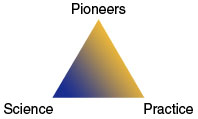
SpringerBriefs on
Pioneers in Science and Practice (PSP)
Edited by
Hans Günter Brauch
Free University of Berlin and AFES-PRESS
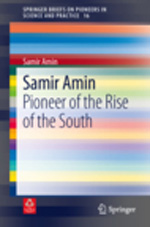 |
Samir Amin: Pioneer on the Rise of the South – Presented by Dieter Senghaas. SpringerBriefs on Pioneers in Science and Practice No. 16 (Cham – Heidelberg – New York – Dordrecht – London: Springer-Verlag, 2014).
ISBN (Print): 978-3-319-01115-8
ISBN (Online/eBook): 978-3-319-01116-5
DOI: 10.1007/978-3-319-01116-5
More on this book
Order Form
Order this book on the Springer Website
Order electronic version and individual chapters |
On this author
On this book
|
Important Links on Samir Amin
Selected Videos with Samir Amin
Books by Samir Amin in French |
Books by Samir Amin in English, Spanish, German and other Languages
Publications on Samir Amin |
| |
|
Samir Amin’s comprehensive scientific bibliography is here
Samir Amin: Pioneer of the Rise of the South
Samir Amin (Egypt/France) is a leading intellectual on underdevelopment and the critique of capitalism. Dieter Senghaas (Germany) presents him as a Pioneer of the Rise of the South. These texts by Samir Amin have been selected for the purpose of encouraging readers to learn more of his work in tracing the historical trajectory of capitalism, which has consistently produced polarization at the global level. Thus the dominated peripheries cannot hope to catch up with the social organization prevailing in the dominant centres. Hence the impossibility of global capitalism being stabilized in its peripheries has resulted in the long decline of capitalism coinciding with successive waves of active involvement by the peoples of the South to shape a new world, potentially embarked on the long road to socialism. Amin presents this major conflict of the 20th century and identifies the new challenges that the system now faces in the 21st century. His analysis is conducted in terms of historical materialism and should be a useful tool for activists struggling for socialism. Their progress cannot be separated from that of the emancipation of the Asian, African and Latin American peoples.
This book includes in Part 1: 1 Biographical Notes; 2 Bibliography. Part 2 offers 4 key texts on the Theory of Historical Capitalism: 3 Theoretical Model of Accumulation and Development in the Contemporary World; 4 Unity and Change in the Ideology of Political Economy; 5 Is Social History Marked by Overdetermination or Underdetermination? 6 Multipolarity in the 20th Century. Part 3 on the Contemporary Challenge analyses 7 The Center Will Not Hold: The Rise and Decline of Liberalism; 8 The Countries of the South Must Take Their Own Independent Initiatives; 9 The Democratic Fraud and the Universalist Alternative; 10 Land Reforms: Desirable Land Tenure Reforms in Africa and Asia; 11 Transnational Capitalism; 12 Africa 50 years of Independence; 13 Aid; 14 Emergence and Lumpen Development, 15 Synthesis. |
| |
|
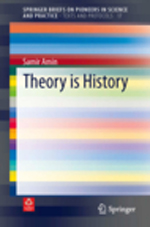 |
Samir Amin: Theory is History. SpringerBriefs on Pioneers in Science and Practice No. 17. Texts and Protocols No. 9 (Cham – Heidelberg – New York – Dordrecht – London: Springer-Verlag, 2014).
ISBN (Print): 978-3-319-03815-5
ISBN (Online/eBook): ISBN 978-3-319-03816-2
DOI: 10.1007/978-3-642-978-3-319-03816-2
More on this book
Order Form
Order this book on the Springer Website
Order electronic version and individual chapters |
| |
This book focuses on a central concept that “Theory is History”, as the theory of capitalism can only be formulated on the basis of an analysis of its history. In contrast, bourgeois thinking replaces the analysis of historical capitalism with an abstract theory without any links to reality. “Economics”, which is the theory of an imaginary system, then becomes an apologia intended to give legitimacy to the behaviour of the owners of capital. The author pays special attention to the globalization of the law of value. The individual chapters illustrate the author’s thesis by focusing on the links between capital and land ownership, between modernity and religious interpretation, and on questions of the global expansion of capitalism, particularly the ways it has evolved in certain countries, in this case Russia and China. This anthology supplements the author’s previous work, centred on the rise of the South—his reading of capitalism focusing on its imperialist nature.
Content Level » Research
Keywords » Globalized Values - Ground Rent - Historical Capitalism - Imperialist Rent - Roads of Development - Third World Forum
Related subjects » Political Science
Table of contents
The globalised law of value.- Capitalism and ground rent.- Modernity and interpretations of religions.- Re-reading the post war period.- Historical capitalism; accumulation by dispossession.- The two paths of historical development; the contrast between Europe and China.- Russia in the world system; geography or history?.- China, the emerging nation. |
| |
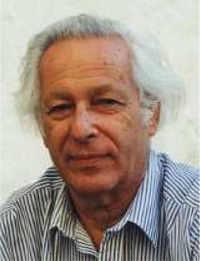
|
Samir Amin (Egypt/France), was born in Cairo as son of an Egyptian father and a French mother (both medical doctors). He spent his childhood and youth in Port Said, where he attended a French High School and obtained a Baccalauréat (1947). He studied in Paris (1947-1957) with degrees in political science (1952),statistics (1956) and economics (1957). His PhD thesis (1957) was on: The origins of underdevelopment - capitalist accumulation on a world scale but retitled The structural effects of the international integration of precapitalist economies. A theoretical study of the mechanism which creates so-called underdeveloped economies. He worked in Cairo (1957-1960) for the government's "Institution for Economic Management". He was an adviser to the Ministry of Planning in Bamako (Mali) (1960-1963). In 1963 received a fellowship at the Institut Africain de Développement Économique et de Planification (IDEP), where he worked until 1970 besides being a professor at the university of Poitiers, Dakar and Paris (of Paris VIII, Vincennes). In 1970 he became director of the IDEP, which he managed until 1980. In 1980 Amin left the IDEP and became a director of the Third World Forum in Dakar.
|
| Samir Amin wrote more than 30 books: Les effets structurels de l’intégration internationale des économies précapitalistes. Une étude théorique du mécanisme qui a engendré les éonomies dites sous-développées (1957); Trois expériences africaines de développement: le Mali, la Guinée et le Ghana (1965); L’économie du Maghreb, 2 vols. (1966); Le développement du capitalisme en Côte d'Ivoire (1967); Le monde des affaires sénégalais (1969); The Class struggle in Africa (1969); Le Maghreb moderne (The Magrheb in the Modern World) (1970); 1970, L’accumulation à l’échelle mondiale (mdöAccumulation on a world scale) (1970); with C. Coquery-Vidrovitch, Histoire économique du Congo 1880-1968 (1970); L’Afrique de l’Ouest bloquée (1971); Le développement inégal (Unequal development) (1973); L’échange inégal et la loi de la valeur (1973); Neocolonialism in West Africa (1973); Le developpement inegal. Essai sur les formations sociales du capitalisme peripherique, Paris: Editions de Minuit (1973); L’échange inégal et la loi de la valeur (1973); with K. Vergopoulos): La question paysanne et le capitalism (1974); with A. Faire, M. Hussein and G. Massiah): La crise de l‘impérialisme (1975); ‘Unequal Development: An Essay on the Social Formations of Peripheral Capitalism’ New York: Monthly Review Press (1976); L’impérialisme et le développement inégal (Imperialism and unequal development) (1976); La nation arabe (The Arab Nation) (1976); La loi de la valeur et le matérialisme historique (The law of value and historical materialism) (1977); Classe et nation dans l’histoire et la crise contemporaine (Class and nation, historically and in the current crisis) (1979); L’économie arabe contemporaine (The Arab economy today) (1980); L’avenir du Maoïsme (The Future of Maoism) (1981); Irak et Syrie 1960 - 1980 (1982); with G. Arrighi, A. G. Frank and I. Wallerstein): La crise, quelle crise? (Crisis, what crisis?) (1982); Transforming the world-economy? Nine critical essays on the new international economic order (1984); La déconnexion (Delinking: towards a polycentric world) (1985); 1988, Impérialisme et sous-développement en Afrique (expanded edition of 1976) (1988); L’eurocentrisme (Eurocentrism) (1988); with F. Yachir): La Méditerranée dans le système mondial (1988); La faillite du développement en Afrique et dans le tiers monde(1989); Transforming the revolution: social movements and the world system (1990); Itinéraire intellectual; regards sur le demi-siecle 1945-90 (Re-reading the post-war period: an Intellectual Itinerary) (1990); L’Empire du chaos (Empire of chaos) (1991); Les enjeux stratégiques en Méditerranée (1991); with G. Arrighi, A. G. Frank et I. Wallerstein): Le grand tumult (1991); Empire of Chaos,New York: Monthly Review Press (1992); L’Ethnie à l’assaut des nations (1994); La gestion capitaliste de la crise (1995); Les défis de la mondialisation (1996); Critique de l’air du temps (1997); Spectres of capitalism: a critique of current intellectual fashions (1999); L’hégémonisme des États-Unis et l’effacement du projet européen (2000); Mondialisation, comprehendre pour agir (2002); Obsolescent Capitalism (2003); The Liberal Virus: Permanent War and the Americanization of the World (2004); with Ali El Kenz, Europe and the Arab world; patterns and prospects for the new relationship (2005); 2006, Beyond US Hegemony: Assessing the Prospects for a Multipolar World (2006); with James Membrez, The World We Wish to See: Revolutionary Objectives in the Twenty-First Century (2008); Aid for Development in Aid to Africa: Redeemer or Coloniser? (2009); Eurocentrism - Modernity, Religion and Democracy: A Critique of Eurocentrism and Culturalism (2010); Ending the Crisis of Capitalism or Ending Capitalism? (2010), Global History - a View from the South (2010); Maldevelopment - Anatomy of a Global Failure (2011). |
| |
|
Important Links on Samir Amin and his Topical Comments
|
Selected Videos with Samir Amin
Please select the five most important interviews for which videos exist:
|
Selected Major Books by Samir Amin in French |
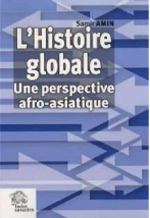 |
L'Histoire globale: Une perspective afro-asiatique
(2013) |
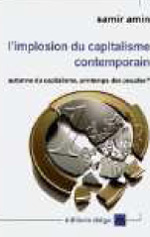 |
L’implosion du capitalisme contemporain,
Automne du capitalisme, printemps des peuples?
Delga 2012 |
| |
|
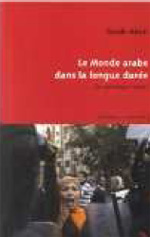 |
Le monde arabe dans la longue durée, le printemps arabe?;
le Temps des Cerises
2011. |
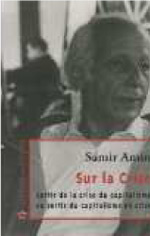 |
Sur la crise, sortir de la crise du capitalisme ou sortir du capitalisme en crise;
Le Temps des Cerises,
Paris 2009. |
| |
|
|
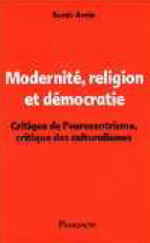 |
Modernité, Religions, Démocratie, Critique de l'eurocentrisme,
Critique du culturalisme;
Parangon, 2008. |
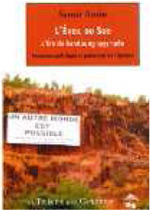 |
L' éveil du Sud, Panorama politique et personnel de l'ère de Bandoung;
Le temps des cerises,
2008. |
| |
|
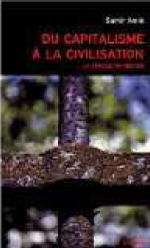 |
Du capitalisme à la civilisation;
Syllepse 2008 |
|
Pour la cinquième internationale;
Le temps des cerises,
2006. |
| |
|
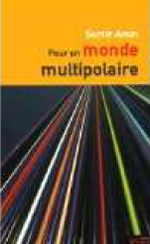 |
Pour un monde multipolaire;
Syllepse 2005. |
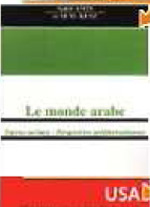 |
Le monde Arabic, enjeux sociaux et perspectives méditerranéennes;
in collaboration with Ali El Kenz,
L' Harmattan, 2003 |
| |
|
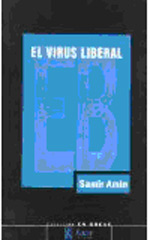 |
Le virus libéral, la guerre permanente et l'américanisation du monde ;
Le Temps des Cerises,
Paris 2003. |
 |
L’hégémonisme des Etats-Unis et l’effacement du projet européen,
L’Harmattan 2000. |
| ( |
|
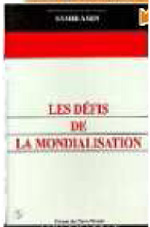 |
Les défis de la mondialisation,
L’Harmattan 1996. |
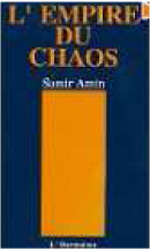 |
L’Empire du chaos, La nouvelle mondialisation capitaliste,
L’Harmattan 1991. |
| |
|
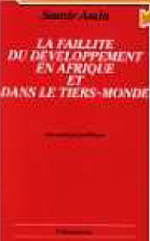 |
La faillite du développement en Afrique et dans le tiers monde,
L’Harmattan, 1989. |
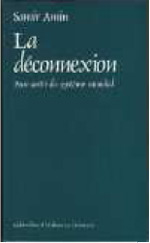 |
La déconnexion, pour sortir du système mondial,
La Découverte 1985. |
| |
|
|
 |
La crise, quelle crise?
Maspero 1982,
in collaboration with G. Arrighi, A. G. Frank and I. Wallerstein |
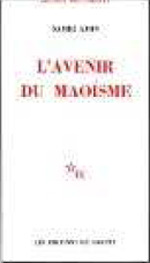 |
L’avenir du maoïsme,
Editions de Minuit 1981. |
| |
|
|
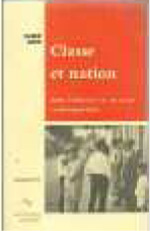 |
Classe et nation dans l’histoire et la crise contemporaine,
Editions de Minuit 1979. |
 |
La loi de la valeur et le matérialisme historique,
Editions de Minuit, 1977. |
| |
|
|
 |
La crise de l’impérialisme,
in collaboration with Faire, Hussein and Massiah,
Editions de Minuit, 1975. |
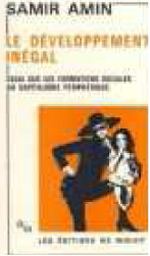 |
L’échange inégal et la loi de la valeur,
Anthropos 1973,
with a contribution by J.C. Saigal.
New edition, Economica, 1988. |
| |
|
|
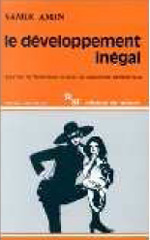 |
Le développement inégal,
Editions de Minuit, 1973. |
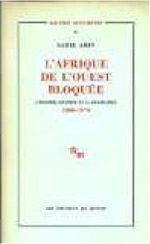 |
L’Afrique de l’Ouest bloquée,
l’économie politique de la colonisation 1880-1970,
Editions de Minuit, 1971. |
| |
|
|
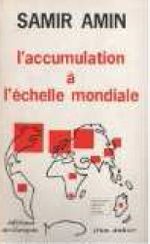 |
L’accumulation à l’échelle mondiale,
critique de la théorie du sous-développement,
Anthropos, 1970, Coll. 10-18.
New Edition with preface, Economica 1988. |
|
Le développement du capitalisme en Côte d’Ivoire,
Editions de Minuit, 1967,
2 Ed. Postface 1971. |
| |
|
|
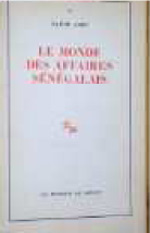 |
Le monde des affaires sénégalais,
Editions de Minuit, 1969,
Du Congo français à l’UDEAC, histoire économique de l’Afrique Equatoriale 1880-1968,
Paris-Dakar, Anthropos, 1979,
in collaboration with Catherine Coquery. |
|
| |
|
|
Selected Major Books by Samir Amin Translated into English |
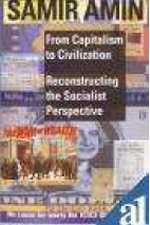 |
From Capitalism to Civilization –
Reconstructing The Socialist Perspective
(Delhi: Tulika, 2010). |
 |
Global History: A View from the South
(Oxford: Pambazuka Press, 2010). |
| |
|
|
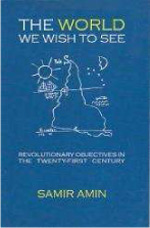 |
The World We Wish to See: Revolutionary Objectives in the Twenty-First Century
(New York: Monthly Review Press, 2008 – Aakar books, 2009). |
 |
Eurocentrism
(New York: Monthly Review Press, 1989, 2010 –
Oxford: Pambazuka, 2010). |
| |
|
|
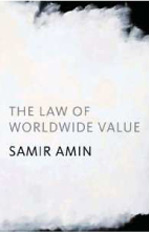 |
The Law of Worldwide Value
(New York: Monthly Review Press, 2010). |
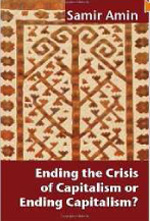 |
Ending the Crisis of Capitalism or Ending Capitalism?
(Pambazuka Press, 2010). |
| |
|
|
 |
The People’s Spring: The Future of the Arab Revolution
(Pambazuka Press, 2010). |
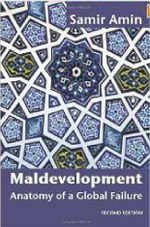 |
Maldevelopment: Anatomy of a Global Failure
(London: Zed, 1990 – Oxford: Pambazuka Press, 2011). |
| |
|
|
 |
The Liberal Virus: Permanent War and the Americanization of the WorldT
(New York: Monthly Review Press – London: Pluto, 2004). |
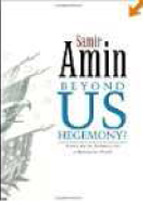 |
Beyond US Hegemony?:
Assessing the Prospects for a Multipolar World
(London: Zed Press, 2006). |
| |
|
|
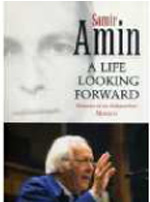 |
A life looking forward, Memoirs of an independent Marxist;
Zed, London 2006. |
 |
Capitalism in the Age of Globalisation,
Zed, London 1996. 20.
Obsolescent capitalism,
Zed 2003. |
| |
|
|
 |
The World We Wish to See:
Revolutionary Objectives in the Twenty-First Century
(New York: Monthly Review Press, 2008). |
 |
Spectres of Capitalism:
A Critique of Current Intellectual Fashions
(New York: Monthly Review Press, 1998). |
| |
|
|
 |
Re-Reading the Postwar Period
(New York: Monthly Review Press, 1994). |
 |
Empire of Chaos
(New York: Monthly Review Press, 1992). |
| |
|
|
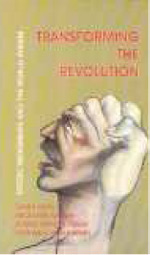 |
Transforming the Revolution,
Monthly Review Press, 1990,
in collaboration with G. Arrighi, A. G. Frank and I. Wallerstein. |
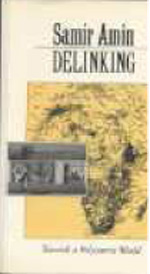 |
Delinking, towards a polycentric world,
Zed, London 1990. |
| |
|
|
| |
The Future of Marxism,
Monthly Review Press, New York 1983;
simultaneously Daanish Books, India 2002 |
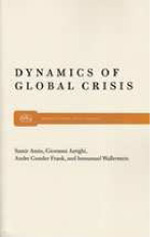 |
Dynamic of Global Crisis,
Monthly Review Press, 1982,
in Collaboration with G. Arrighi, A. G. Frank and I. Wallerstein |
| |
|
|
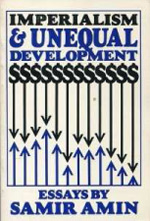 |
Imperialism and Unequal Development
(New York: Monthly Review Press, 1977). |
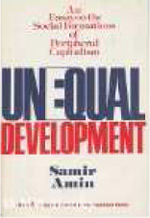 |
Unequal Development,
Monthly Review Press, New York, 1976. |
| |
|
|
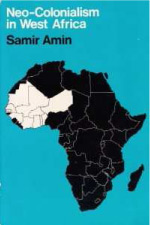 |
Neo-Colonialism in West Africa
(New York: Monthly Review Press, London: Penguin, 1971). |
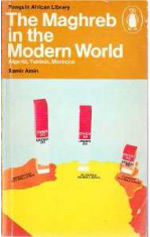 |
The Maghreb in the Modern World: Algeria, Tunisia, Morocco
(London: Penguin, 1970). |
| |
|
|
Selected Major Books by Samir Amin Translated into Spanish |
 |
Primavera arabe, El mundo arabe en la larga duracion;
El Viejo Topo, Barcelone 2011. |
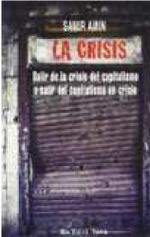 |
La crisis, salir de la crisis del capitalismo o
salir del capitalismo en crisis;
El Viejo Topo, Barcelone, 2009 |
| |
|
|
 |
Critica de nuestro tiempo.
A los ciento cincuenta anos del Manifiesto comunista
(Siglo XXI Editores Mexico, 2007). |
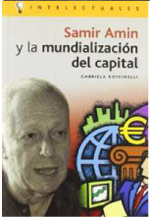 |
Samir Amin y la mundializacion del capital /
Samir Amin and the Globalization of Capital (Intelectuales)
(Campo de Ideas, 2002). |
| |
|
|
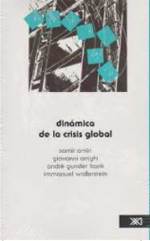 |
Giovanni Arrighi, Andre Gunder Frank Samir Amin:
Dinamica de la crisis global
(Siglo XXI Editores Mexico. 1983). |
 |
Los Desafios de la mundializacion
(Siglo XXI Editores Mexico, 1997). |
| |
|
|
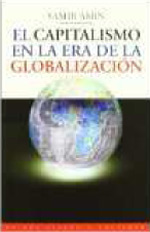 |
El capitalismo en la era de la globalizacion,
Paidos, Barcelona, Buenos Aires, Mexico, 1998. |
|
Capitalismo y sistema mundo,
Lafarga edicions, Barcelona, 1993. |
| |
|
|
Selected Major Books by Samir Amin Translated into German |
 |
Für ein nicht-amerikanisches 21. Jahrhundert
(Hamburg, Publications on Samir Amin-Verl., 2003). |
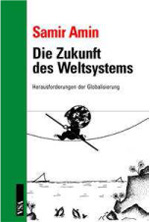 |
Die Zukunft des Weltsystems
(Hamburg, VSA-Verl., 1997). |
| |
|
|
Publications on Samir Amin |
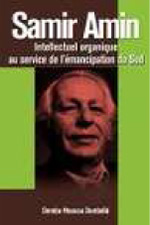 |
Samir Amin, intellectuel organique au service de l’émancipation du Sud ;
Entretiens et textes choisis par Demba Moussa Dembélé,
Codesria 2011. |
 |
Samir Amin:
La théorie du système capitaliste,
critique et alternatives
de Gabriela Roffinelli et Florence Curt
(2013). |
| |
|
|
|
|
|
| |
|
|
|
|